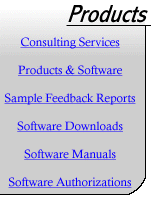 | |||||||||
 |
The most widely accepted model of emotional intelligence (EI) has been influenced by several scientists and researchers. Howard Gardner’s (1983) theory of multiple intelligence lists interpersonal and intrapersonal intelligence as unique and different from the mathematical/logical type recognized today as “IQ” or general intelligence. Peter Salovey and John Mayer first proposed their theory of EI in 1990 and Reuven Bar-On (1988) has placed EI in the context of health and well-being. Daniel Goleman (1998) formulated EI in terms of a theory of organizational and job performance. All these models, however, share a common core of basic concepts including Self-Awareness, Self-Management, Social Awareness, and Relationship Management. Emotional Intelligence View 360 assesses key competencies in each of these four areas. The comprehensive feedback report is designed to enhance both self-awareness and relationship management skills. Emotional Intelligence View 360 is suitable for coaching, leadership and professional development programs.
What is the association between Emotional Intelligence and Effectiveness? A growing research literature suggests that Emotional Intelligence may play a far more important role in career success and job performance than "general intelligence" or IQ. Studies suggest that: ü Highly conscientious employees who lack social and emotional intelligence perform more poorly than those high in both conscientiousness and emotional intelligence ü On average, strengths in purely cognitive capacities are approximately 27 percent more frequent in high performers than in the average performers, whereas strengths in social and emotional competencies are 53 percent more frequent ü The highest performing managers and leaders have significantly more "emotional competence" than other managers ü Poor social and emotional intelligence are strong predictors of executive and management “derailment” and failure in one’s career Emotional Intelligence View 360 was developed by Kenneth M. Nowack, Ph.D. who is a licensed psychologist and researcher in the area of 360 degree feedback, emotional intelligence and occupational health. Dr. Nowack is a member in Daniel Goleman's Consortium for Research on Emotional Intelligence in Organizations http://www.eiconsortium.org/members/membership_consortium.htm Additional Emotional Intelligence View 360 validation, psychometric properties and research information can be found: Nowack, K., (2002). Does 360 degree feedback negatively effect company performance: Feedback varies with your point of view. HR Magazine, Volume 47 (6), June 2002. Article Nowack, K. and Heller, B. (December, 2001). Making Executive Coaching Work. Training Magazine Article (Adobe Acrobat PDF) Nowack, K., Hartley, J, & Bradley, W. (1999). Evaluating results of your 360-degree feedback intervention. Training and Development, 53, 48-53. Abstract Nowack, K. (1999). 360-Degree feedback. In DG Langdon, KS Whiteside, & MM McKenna (Eds.), Intervention: 50 Performance Technology Tools, San Francisco, Jossey-Bass, Inc., pp.34-46. Abstract Wimer, S. and Nowack, K. (1998). Thirteen common mistakes in implementing multi-rater feedback systems. Training and Development, 52, 69-80. Abstract Nowack, K. M. (1994). The secrets of succession: Emphasizing development in succession planning systems. Training and Development, 48, 49-54. Abstract Nowack, K. (1993). 360-Degree feedback: The whole story. Training & Development Journal, 47, 69-72 Abstract Nowack, K. (1992). Self-assessment and rater-assessment as a dimension of management development. Human Resources Development Quarterly, 3, 141-155. Abstract
| ||||||||
|
Site design by Chromatic Concepts | |||||||||